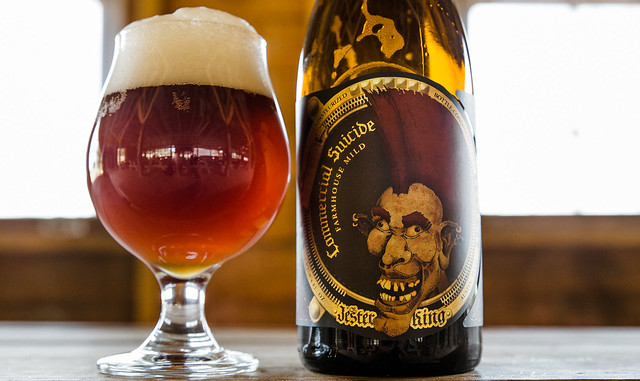Thoughts on Commercial Suicide and Acidity in Beer
July 14, 2017
This weekend we’re releasing our latest batch of Commercial Suicide — our farmhouse mild ale. Commercial Suicide is one of the oldest beers we make, inspired by classic English Mild. The name for the beer, which was created by Jester King co-founder Michael Steffing, comes from back in 2010 when we believed we’d created a beer for essentially no audience. We thought it was too dark for mainstream beer drinkers and too small for beer geeks. In reality, Commercial Suicide found an audience. While far from our most popular beer, it does just fine.
For our latest batch, our Head Brewer Averie Swanson decided to steer it more in the direction of its classic roots. Here’s what Averie has to say about it:
“For this batch of Commercial, we wanted to return to more of a traditional English-style Dark Mild flavor profile. We upped the IBUs in the recipe to coax our mixed-culture into a less acid-driven expression, and modified the grain bill a bit by adding a bit of roasted barley and more flaked grains than we have in the past to give the beer a bit more body. The result is a super-drinkable beer with low to medium bitterness, depth of malt character presenting as chocolate and soft roast, with a fairly clean and complementary yeast profile.”
We often times get referred to as a “sour brewery” here at Jester King, which is totally fine. What sometimes gets overlooked is that we make a number of beers that don’t have a significant acid component. Everything we ferment, whether mixed-culture or 100% spontaneous beer, contains souring bacteria. But not all of our beer is sour. We use variables like hopping rates, temperature, fermentation vessel, and fermentation time to steer the acidity in different directions. Ultimately, I believe we approach acidity similar to how a chef does when composing a dish. We use it to create balance, drinkability, and hopefully enjoyment.
Over the long term, almost all our beer starts to become a little tart or sour. The bacteria has a way of winning in the end. But for the initial weeks and months, many of our beers aren’t that sour. For instance, Le Petit Prince, Wytchmaker, Bière de Miel, Simple Means, Black Metal, and Live Oak / JK Kollaborationsbier all are examples of beers that present dry, bitter, hoppy, and yeast-driven for at least the first few months. Our latest batch of Commercial Suicide would make this list in our opinion.
This isn’t to suggest (to steal a phrase) we’re “sour on sour”. We love sour beer. We make lots of sour beer. But just as we were influenced by classic sour beer makers like Cantillon, Jolly Pumpkin, and Russian River, we were also influenced by bitter, dry, hoppy farmhouse ales from De la Senne, De Ranke, and Thiriez (to name a few). Just as we make beers with soft but fairly prominent acidity, we also make beers where the acid component is largely restrained. All we ultimately claim to do is make beer tied to a time, place, and people, which means the acidity can vary greatly from beer to beer within our lineup.
Finally, on a personal note, I’m really excited to see more classic, English-inspired beers taking root in the United States. For instance, we’ve had the pleasure of drinking incredible English-style beers at places like Hogshead Brewery in Denver and Machine House Brewery in Seattle, and we’re excited to soon drink classic English styles from Acopon Brewing in nearby Dripping Springs, Texas. These beers are incredibly enjoyable, drinkable, and social, and they deserve more homes on tap walls across the U.S.


